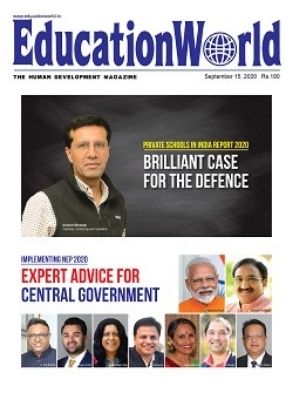
Even as the newly renamed Union education ministry has rather belatedly invited suggestions from school teachers and principals for ways and means to implement NEP 2020, the ministry will do well to heed the recommendations of your carefully selected panel of education experts. They have done an excellent job of recommending ways to execute NEP 2020.
I believe the key to successful implementation of NEP 2020 is doubling spending on public education to 6 percent of GDP. Without money, none of these grandiose plans to transform India into an education superpower will materialise.
Mallika Bothra, Gurgaon
Dispelled myths
Your cover story ‘Private Schools in India Report 2020: Brilliant case for the defence’ (EW September) makes a compelling case for supporting private education. The report’s finding that 70 percent of private schools in India charge less than Rs.1,000 per month dispels many deeply rooted myths about private schools, particularly that they are exclusive elitist institutions that levy exorbitant fees.
Unfortunately the National Education Policy 2020 endorses many biases against private schools. In fact as you rightly say, its ‘anti-privatisation’ stance will discourage private investment and healthy competition — widely acknowledged as the recipe for excellence — in Indian education.
Moreover, the deliberate exclusion of inputs of private education leaders in the NEP drafting process is alarming when close to 50 percent of India’s school-going children are enrolled in privately promoted schools. Despite its seemingly futuristic vision, the devil lurks in the details of NEP 2020!
Devi Batra, Bangalore
Teacher training priority
Thank you for the excellent cover story on the National Education Policy 2020 (EW August). I welcome the renewed emphasis on teacher training and professional standards in NEP 2020, with the hope that this too-good-to-be-true policy document is implemented in letter and spirit!
Drawing from my varied experience of several decades as an educator, I am of the opinion that more than anything, India needs high quality teachers passionate about the profession. But this profession can only become effective when teachers are paid respectable salaries on a par with corporate professionals.
I am in sync with NEP policymakers that teacher education — the Achilles heel of Indian education — needs urgent overhaul. It’s noteworthy that in most foreign countries, youth aspiring to qualify as teachers first work part-time in a school and based on feedback from the head of school, students and parents get the go-ahead for pursuing teacher qualifications.
A major challenge confronting principals and school leaders is of assessing would-be teachers for temperament and personality, love for children and the profession. Written exams followed by interviews are hardly indicative of good teaching and communication skills that enable meaningful teacher-pupil interaction.
Moreover, with 70 percent of the population living in rural India, it’s important for urban students to be sensitised about life of their rural counterparts. My suggestion is that private and government school managements arrange compulsory tours to village India to provide students ‘beyond the school’ immersive experiences.
Dr. Shayama Chona President, Tamana Autism Centre Delhi
Huge edtech potential
I am a regular reader of EducationWorld magazine and enjoy reading the excellent essays written by your columnists. I fully agree with the views expressed by international edtech consultant Roshan Gandhi in Expert Comment (EW August) that education technology has huge potential to assist in solving some of India’s biggest education problems, and enabling implementation of the progressive recommendations of NEP 2020.
This is a wake-up call for the edtech sector. Over the past few months it has experienced massive demand for online education services. Edtech offers a short-cut to develop a high-quality education system without waiting for NEP to catch up!
Brijesh Agarwal, Pune